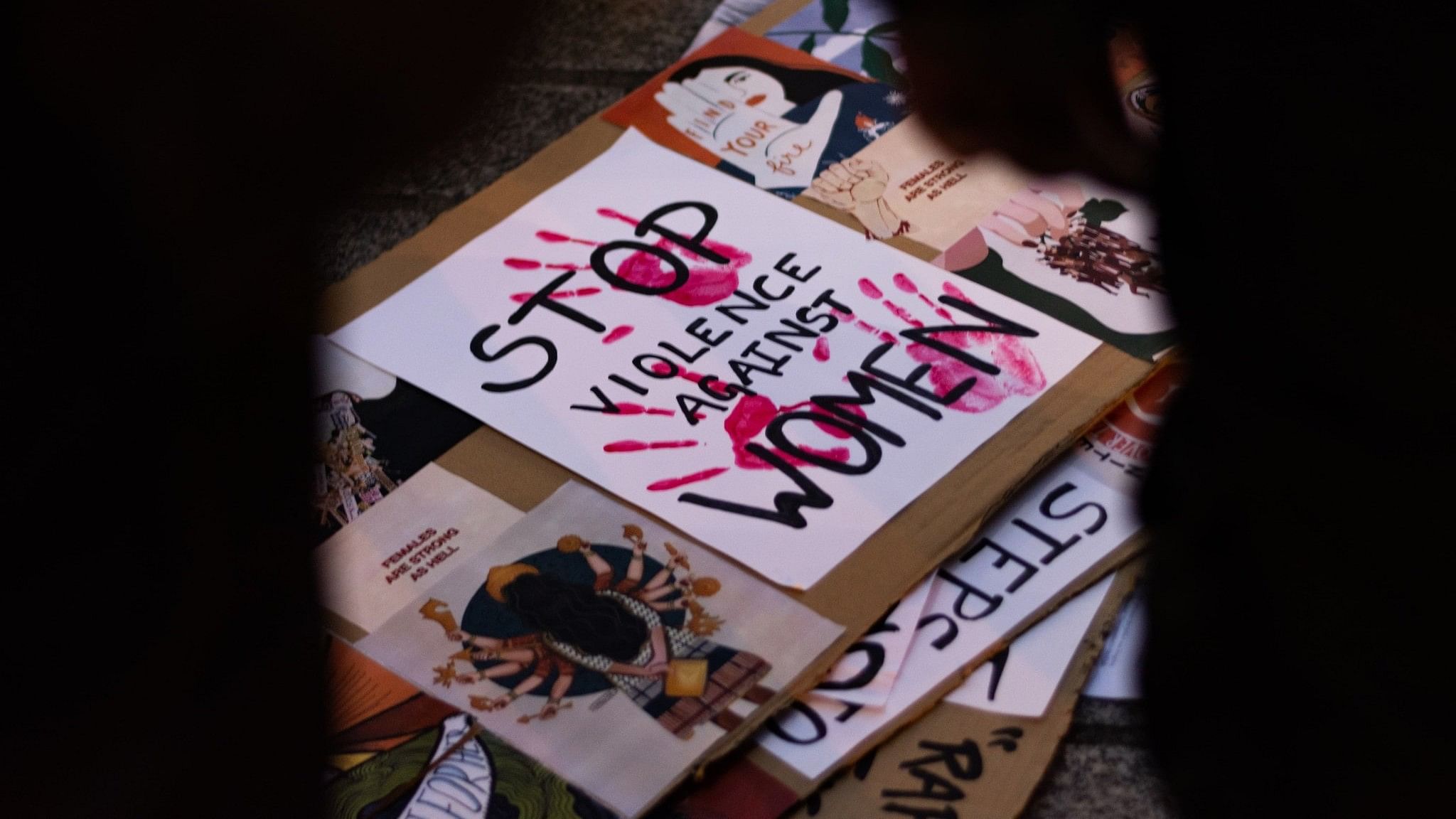
Placards made by the Students' Federation of India – United Kingdom to protest against the Kolkata medic's rape and murder.
Credit: X/@sfi_uk
From the harrowing daylight rape of a woman on a bustling street in Ujjain to the brutal rape and murder of a trainee doctor at Kolkata’s medical college, India’s escalating crisis of sexual violence against women is not just a series of grim statistics—it is a profound national tragedy. These incidents are far from isolated or random; they are glaring testaments to a systemic collapse across the country. In 2022, the last available government figures reveal a staggering 31,000 reported cases of rape, amounting to 85 rapes every day. These horrifying numbers are only the tip of the iceberg, with countless assaults concealed beneath layers of societal pressure, fear of retaliation, and systemic failures.
Around the time of the 2012 Delhi Nirbhaya rape case, the police were already recording 25,000 rape cases annually across India, according to the National Crime Records Bureau (NCRB). Since then, the number has remained disturbingly high, consistently surpassing 30,000—except in 2020, during the Covid-19 pandemic year, when there was a rare dip. The situation peaked in 2016 with nearly 39,000 cases. In 2018 alone, a government report revealed that a rape was reported every 15 minutes across the nation. Even more disheartening is the dismally low conviction rate, hovering at just 27-28% between 2018 and 2022, one of the lowest for serious crimes in India. By comparison, Britain’s conviction rate for rape-related cases was 60.2% in financial year 2023-2024 and 63.5% the year earlier, according to Crown Prosecution Service data. For every brave survivor who steps forward in India, only one in four sees any semblance of justice, leaving countless victims’ voices unheard and unheeded.
The nightmarish reality of rape and murder cases across India exposes a devastating truth: India’s institutions have catastrophically failed. Law enforcement’s staggering incompetence, rampant corruption, and pervasive political interference betray victims at every turn, leaving them defenceless. The caste and power dynamics are equally horrifying—Dalit women endure unimaginable violence, their tormentors shielded by a caste hierarchy that perpetuates impunity. The rampant youth unemployment fuels a volatile mix of frustration and aggression that erupts into barbaric acts of sexual violence. Perhaps most chilling are the deep-seated cultural and patriarchal norms that reduce women to mere objects of male dominance, perpetuating this epidemic of violence. Until we confront these ingrained prejudices with urgency, women in India’s cities and villages will continue to live in fear.
Returning to the tragedy in Ujjain, the horror extends far beyond the assault itself—it is the collective failure of those around the victim to act that is truly chilling. This incident forces us to confront a disturbing question: Have we become so numb to violence that we’ve lost our humanity? The rapist is undeniably a criminal, but so too are the silent witnesses who stood by, paralysed, and indifferent, as this atrocity unfolded. Despite the waves of outrage that follow every high-profile rape case—whether the 2012 Delhi gang rape or the recent horrors in Madhya Pradesh and West Bengal—the systemic changes needed to safeguard women remain glaringly absent. The public outcry on social media has become a hollow ritual, failing to ignite real-world action. It’s time to recognise that our duty goes far beyond expressing outrage on social media; it demands real, tangible action to protect the vulnerable and confront this crisis head-on. Each day without meaningful interventions costs women their freedom, their safety, and, too often, their lives.
Despite the legal reforms and harsher penalties promised after the 2012 Delhi gang rape, the grim reality is that little has changed. With over 30,000 reported rape cases annually and the peak of nearly 39,000 in 2016, we should have witnessed a national outcry and decisive action. Instead, our response remains woefully inadequate. The ongoing rape crisis is not just damaging India’s global reputation; it’s a national emergency screaming for immediate intervention. The government’s abject failure to tackle the systemic collapse in protecting women is evident and deeply disturbing.
The National Women’s Commission has proven ineffectual, a mere facade that masks a monumental crisis. It is time for a radical overhaul. India needs an independent, apolitical body dedicated exclusively to addressing sexual violence—free from the suffocating grip of political interference. This entity must be established in Parliament’s next session, with the urgency it demands, prioritising the safety and justice of millions of women across our nation.
(The writer is the director, AF Development Care, New Delhi)